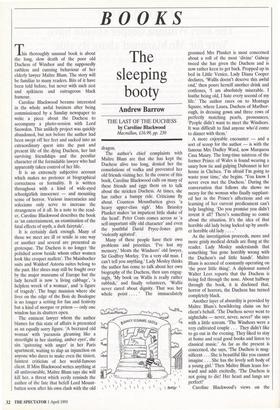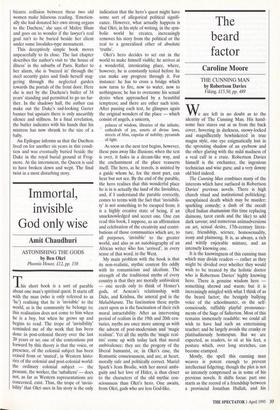BOOKS
The sleeping booty
Andrew Barrow
THE LAST OF THE DUCHESS by Caroline Blackwood Macmillan, £16.99, pp. 230 This thoroughly unusual book is about the long, slow death of the poor old Duchess of Windsor and the supposedly ruthless and cunning behaviour of her elderly lawyer Maitre Blum. The story will be familiar to many readers. Bits of it have been told before, but never with such zest and spikiness and outrageous black humour.
Caroline Blackwood became interested in the whole awful business after being commissioned by a Sunday newspaper to write a piece about the Duchess to accompany a photo-session with Lord Snowdon. This unlikely project was quickly abandoned, but not before the author had been swept off her feet and sucked into an extraordinary quest into the past and present life of the dying Duchess, her last surviving friendships and the peculiar character of the formidable lawyer who had apparently taken control of her life.
It is an extremely subjective account which makes no pretence at biographical correctness or formality. It is written throughout with a kind of wide-eyed schoolgirlish innocence — and mounting sense of horror. Various inaccuracies and solecisms only serve to increase the strangeness of it all. In a note to the read- er, Caroline Blackwood describes the book as 'an entertainment, an examination of the fatal effects of myth, a dark fairytale'.
It is certainly dark enough. Many of those we meet are ill or senile in one way or another and several are presented as grotesque. The Duchess is no longer 'the polished arrow beside whom other women look like croquet mallets'. The Mainbocher suits and Waldorf Astoria suites belong to the past. Her shoes may still be fought over by the major museums of Europe but the lady herself is now 'a living cabbage', 'a helpless wreck of a woman', and 'a figure of tragedy'. The huge mansion where she lives on the edge of the Bois de Boulogne is no longer a setting for fun and festivity but a kind of morgue or prison — only one window has its shutters open.
The eminent lawyer whom the author blames for this state of affairs is presented as an equally sorry figure. 'A becrazed old woman' with 'paranoia gleaming like a streetlight in her slanting, amber eyes', she sits 'quivering with anger' in her Paris apartment, waiting to slap an injunction on anyone who dares to make even the tiniest, faintest criticism of her world-famous client. If Miss Blackwood writes anything at all unfavourable, Maitre Blum says she will kill her, a threat which eerily reminds the author of the fate that befell Lord Mount- batten soon after his own clash with the old dragon.
The author's chief complaints with Maitre Blum are that she has kept the Duchess alive too long, denied her the consolations of vodka and prevented her old friends visiting her. In the course of this book, Caroline Blackwood calls on many of these friends and eggs them on to talk about the stricken Duchess. At times, she has rather a bumpy ride. Criticisms fly about. Countess Mountbatten gives 'a heavy upper-class sigh'. Mrs Brinsley Plunket makes 'an impatient little shake of the head'. Peter Coats comes across as 'a self-important silly old character' and even the youthful David Pryce-Jones gets `violently agitated'.
Many of these people have their own problems and priorities. 'I've lost my memory,' bleats the Windsors' old lawyer, Sir Godfrey Morley. 'I'm a very old man. I can't tell you anything.' Lady Mosley thinks the author has come to talk about her own biography of the Duchess, then says engag- ingly, 'My book on Wallis is really rather rubbish,' and finally volunteers, 'Wallis never cared about dignity. That was her whole point . . . . ' The immaculately groomed Mrs Plunket is most concerned about a roll of the most 'divine' Galway tweed she has given the Duchess and is now rather keen to get back. Propped up in bed in Little Venice, Lady Diana Cooper declares, 'Wallis doesn't deserve this awful end,' then pours herself another drink and confesses, 'I am absolutely miserable. I loathe being old, I hate every second of my life.' The author races on to Montagu Square, where Laura, Duchess of Marlbor- ough, in dressing gown and three rows of perfectly matching pearls, pronounces, `People didn't want to meet the Windsors. It was difficult to find anyone who'd come to dinner with them.'
A more enjoyable encounter — and a sort of scoop for the author — is with the famous Mrs Dudley Ward, now Marquesa Casa Maury. The long-time mistress of the former Prince of Wales is found wearing a saucy bow tie and gulping Dubonnet in her house in Chelsea. 'I'm afraid I'm going to waste your time,' she begins. 'You know I never even met the Duchess.' During the conversation that follows she shows no mercy for the woman who finally supplant- ed her in the Prince's affections and on learning of her current predicament can't help laughing. 'Do you promise you didn't invent it all? There's something so comic about the situation. It's the idea of that horrible old lady being locked up by anoth- er horrible old lady . . . . '
As the investigation proceeds, more and more grisly medical details are flung at the reader. Lady Mosley understands that something 'has gone horribly wrong with the Duchess's sad little hands'. Maitre Blum is accused of constantly operating on `the poor little thing'. A diplomat named Walter Lees reports that the Duchess is being fed through the nose. About halfway through the book, it is disclosed that, horror of horrors, the Duchess has turned completely black.
Another layer of absurdity is provided by Maitre Blum's bewildering claim on her client's behalf. 'The Duchess never went to nightclubs — never, never, never!' she says with a little scream. 'The Windsors were a very cultivated couple . . . They didn't like to go out in the evening. They liked to stay at home and read good books and listen to classical music.' As far as the present is concerned, she says, 'The Duchess is mag- nificent . . . She is beautiful like you cannot imagine . . . She has the lovely soft body of a young girl.' Then Maitre Blum leans for- ward and adds excitedly, The Duchess is not going to die! Her heart and lungs are perfect!'
Caroline Blackwood's views on the bizarre collision between these two old women make hilarious reading. 'Emotion- ally she had donated her own strong organs to the Duchess,' she says of Maitre Blum and goes on to wonder if the lawyer's real goal isn't to be buried beside her client under some Invalides-type monument.
This deceptively simple book moves unpeacefully to its close. The last chapter describes the author's visit to 'the house of illness' in the suburbs of Paris. Rather to her alarm, she is 'buzzed in' through the ' steel security gates and finds herself stag- gering through the neglected garden towards the portals of the front door. Here she is met by the Duchess's butler of 34 years' standing and permitted to go no fur- ther. In the shadowy hall, the author can make out the Duke's sad-looking Garter banner but upstairs there is only unearthly silence and stillness. In a final revelation, the butler indicates with his hands that his mistress has now shrunk to the size of a baby.
An Epilogue informs us that the Duchess lived on for another six years in this condi- tion and was eventually buried beside the Duke in the royal burial ground at Frog- more. At the internment, the Queen is said to have broken down and wept. The final twist in a most disturbing story.



























































 Previous page
Previous page